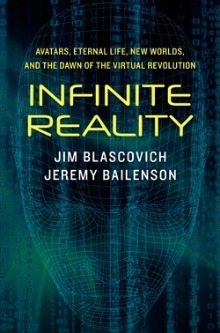Matt Rees's Blog - Posts Tagged "virtual-reality"
Getting Inside Your Head: Virtual Reality guru Jeremy Bailenson's Writing Life
 Move over cards, cocaine, and nicotine, Virtual Reality is the new addiction. It isn’t restricted to the realms of academe or science fiction. Whether you know it or not, it’s going to change your life. It already may have done so. Stanford University Professor Jeremy Bailenson is co-author of a new book, Infinite Reality, which explains how our world is being altered by…a world that isn’t really there. A compelling thinker and one of the foremost young experts on VR, Bailenson’s book (on the shelves April 11) is sure to change the way you look at all aspects of the future and its intersection with rapidly developing technologies. With the arrival of “avatars” of ourselves, it might even change how you look at yourself. Here’s what he told me about his work and the new book:
Move over cards, cocaine, and nicotine, Virtual Reality is the new addiction. It isn’t restricted to the realms of academe or science fiction. Whether you know it or not, it’s going to change your life. It already may have done so. Stanford University Professor Jeremy Bailenson is co-author of a new book, Infinite Reality, which explains how our world is being altered by…a world that isn’t really there. A compelling thinker and one of the foremost young experts on VR, Bailenson’s book (on the shelves April 11) is sure to change the way you look at all aspects of the future and its intersection with rapidly developing technologies. With the arrival of “avatars” of ourselves, it might even change how you look at yourself. Here’s what he told me about his work and the new book:Before we get to writing, here’s a virtual reality question. How soon will governments and corporations be able to control our behavior with virtual reality? And how?
Children play video games for more time per day than they watch movies and read books combined. Video games are becoming more “immersive,” that is, closer and closer to virtual reality, each year. Whether or not governments will use the medium to “control” us is up for debate, but there is little doubt that the next generation of lawmakers will look to virtual reality first and other media second when shaping laws, creating entertainment, and conducting commerce.
How long did it take you to get this book published?
From start—phone call from an agent suggesting I write a book—to finish—book available in stores--the process was about three years.
What’s a typical writing day?
I wake up early, drink coffee, and get my best writing done between 7am and 10am, and typically put in another few hours in the afternoon. Some days are longer days on which I pound the prose for double digit hours but those are the exception, not the rule. It’s a marathon, not a sprint…
Plug “Infinite Reality.” How would you describe what it’s about? And of course why’s it so great?

Infinite Reality is a survival guide for anyone seeking to understand how the virtual revolution is changing life as we know it—for example psychology, religion, education, entertainment, relationships, and business. For the past fifteen years, Blascovich and I have been running experiments to understand what happens to the mind inside virtual reality, with the idea that “someday” the technology would be a part of the average person’s daily life. It turns out “someday” has arrived. Children between the ages of 6 and 16 spend over 8 hours per day using digital media, and Internet addiction is quickly becoming a rival to substance abuse and gambling. Infinite Reality gives readers the tools to understand what Virtual Reality is and how it will affect their lives.
What’s it like to co-write a book?
The great part is being able to bounce ideas off one another and to have another person who is a highly invested editor. In our penultimate edit, Jim and I sat side by side and read OUT LOUD every single word of the book, and then argued over prose, grammar, and content. We averaged about thirty minutes per page. Needless to say it was a grueling month.
What’s your favorite sentence in all literature, and why?
“Cyberspace. A consensual hallucination experienced daily by billions”. In the late seventies when William Gibson is setting the stage for the virtual revolution we are experiencing today, he really captured the essence of virtual reality. Today there are many people who prefer their “hallucinations” to the physical world.
You’re a fan of Gibson’s “Neuromancer.” Some people say his sci-fi fiction “invented” the internet and cyberspace. Is that true? Did fiction-writing actually lead to all these subsequent scientific developments?
Neuromancer was without a doubt what inspired me to become a scholar of avatars. Gibson’s unprecedented vision of cyberspace redefines what it means to be human—mortality is optional, people can transform their gender, age, and identity at the drop of a hat, and the notions of pleasure and pain move beyond the flesh. Indeed these themes are pervasive throughout my research and throughout our book Infinite Reality. I first read it in high school, and like many Stanford students I force to read it in my courses, I didn’t really “get it”. It’s a challenging read on the first try, and some of the big ideas take a few reads before they grab hold. I didn’t pick the book up again for about a decade, in my fifth year of graduate school, where I was floundering without direction in my research, running cognitive psychology experiments and then designing computer programs that mimicked thought. But before dropping out of academia altogether, one job advertisement in particular resonated with what I had read in Neuromancer, and I decided to give university life one more try. I took a research position at UCSB studying avatars. Since then, Neuromancer has been my crutch. Large government grants have been awarded to me for building and testing Gibson’s ideas. Academic papers are improved by Gibson quotes that sum up the big ideas of the research. PhD students walk out of my office with a copy when searching for dissertation topics. Undergraduates who can’t imagine the world without the “cyberspace” Gibson predicted (or perhaps facilitated) grumble about using it as a textbook in my lecture classes.
Read the rest of this post on my blog The Man of Twists and Turns.
Published on April 10, 2011 00:29
•
Tags:
black-sabbath, infinite-reality, interviews, jeremy-bailenson, neuromancer, richard-morgan, sci-fi, science-fiction, virtual-reality, william-gibson, writers, writing-life



